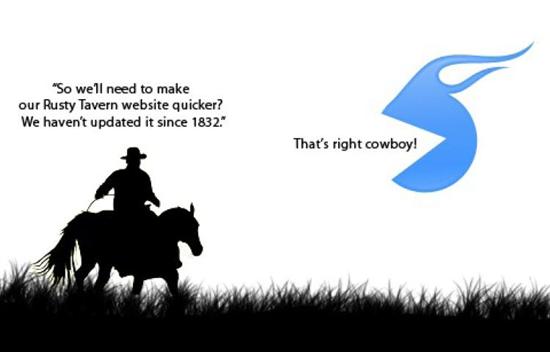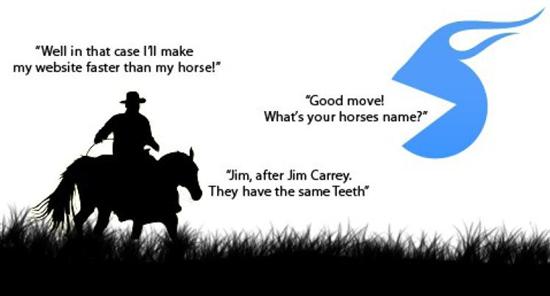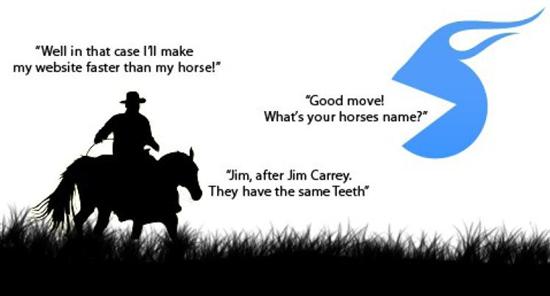Effect of Website Speed on Users
Statistics Reveal Slow Loading Times Cost Sites Serious Money
I really don’t like to advocate wasting a whole bunch of time trying to fix something that is not broken, or something that is not really going to help you make additional cash.
At the end of the day there’s a lot of aspects of your business you could be spending time and money on. To decide where you should focus your time and resources depends on where it will have the biggest impact.
If your website’s speed is not going to stick some extra silver coins in your pocket, and your own users don’t really care that much, then why should you give a munch?
Here’s what we really need to know…
What impact will site speed have on your bottom line?
Test Your Knowledge
- User’s will be happy if a website loads in under ____ seconds or less.
- How many extra seconds before I lose more than 20% of my visitors?
- The average website would lose __% per year if the site was 1 second slower.
Now let’s dig in with what we all know…
Really Slow Websites Are a Disaster
You don’t need a smart-ass study or clever conversion rate scientist to tell you this. But what a solid scientific study can tell us is just how much of a disaster slow websites really are…
A 2006 study by Akamai revealed:
- 75% of people would not return to websites that took longer than 4 seconds to load.
- The big spenders on the net ranked page-loading time as a priority
Would we agree that a 4 second load time is slow? Well 75% of people think so, they would not even go back to that site.
That was in 2006. Akamai did a study before 2006 and found that the threshold for really annoying visitors was 8 seconds instead of 4 seconds. It doesn’t take a genius to work out that these days people’s expectations are going to be even higher. 
A more recent study by Fiona Fui-Hoon Nah in the University of Nebraska said that tolerable wait times have decreased to just 2 seconds.
Count 2 seconds out loud… one…. two… any longer and you’ve just lost a big chunk of your audience!
A study released by Akamai in September 2009 came to similar conclusions:
- 47% expect a web page to load in two seconds or less.
- 40% will abandon a web page if it takes more than three seconds to load.
- 52% of online shoppers claim that quick page loads are important for their loyalty to a site.
- 14% will start shopping at a different site if page loads are slow, 23% will stop shopping or even walk away from their computer.
- 64% of shoppers who are dissatisfied with their site visit will go somewhere else to shop next time.
Google Gives a Munch!
Google has stated that they now consider site speed in the rankings of a website.
“You may have heard that here at Google we’re obsessed with speed, in our products and on the web. As part of that effort, today we’re including a new signal in our search ranking algorithms: site speed.”
-Google Webmaster Central Blog
This has been confirmed by bloggers and webmasters who have tested the effect of site speed on rankings.
A study by LightSpeedNow showed that by making a website faster Google sent 15% more traffic, and Bing and Yahoo also sent more traffic.
I’ve come across several webmasters stating that there website traffic dropped significantly when Google introduced site-speed into its algorithm. One even saw an 80% drop!
A Slow Site Will Alienate Your Audience
Will people hold it against your brand if your site is slow? Will they come back? Will they go to a competitor instead? How will the rate your site?
Let’s find out…
People Run From Slow Sites…
The Gomez Peak Time Internet Usage Study conducted by Equation Research on 1500 consumers (February 2010) confirms the negative impact of poor performance:
- At peak traffic times, more than 75% of online consumers left for a competitor’s site rather than suffer delays
- 88% of online consumers are less likely to return to a site after a bad experience
- Almost half expressed a less positive perception of the company overall after a single bad experience.
- More than a third told others about their disappointing experience
Put bluntly, if your site is slow your readers will get angry and go somewhere else.

People Stick Around on a Fast Site…
A case study from Aptimize showed that when they made the website Geekzone faster the following results were achieved:
- 35.10% increase in average time on site
- 13.63% increase in number of pages per visit
- 3.7 percent reduction in bounce rate
People Change in a Bad Way on Slow Sites…
A 2004 Study by Skadberg & Kimmel showed that speed affects people’s evaluation of the attractiveness and the content of a Web site. In other words if your website is slower, people will actually like your actual content less, even though the quality of your site’s content should in theory be the same whether your site is fast or slow.
According to the study:
- When people are in a state of flow they tend to learn more about the content presented on the website.
- The increased learning leads to changes of attitude and behavior, including taking positive actions.
There’s a lot more to this than just having a few visitors hit the back button because your site is slow, those that do stay on a slow site will be less likely to buy from, subscribe to, read, engage in and recommend your website.
The advanced SEOs will know that improved user engagement helps improve website rankings (Google has a lot of tools at its disposal to track this and it does). So even if Google did not measure site speed directly in its ranking algorithm, improving site speed would still help achieve better rankings.
The fact Google does look at site speed as a factor in rankings means that there’s a double impact on rankings when you improve site speed. You make Google happy by having a faster site and improved user engagement.
That will explain why some people have seen such positive results with Google rankings when they make their website faster.
The Proof That Milliseconds Matter
The big guys in the industry have really dug deep and proved that those milliseconds matter.
- For every 100ms increase in load time of Amazon.com decreased sales by 1% (Kohavi and Longbotham 2007).
- Google discovered that a change from loading a 10-result page in 0.4 seconds to a 30-result page loading in 0.9 seconds decreased traffic and ad revenues by 20% (Linden 2006).
- Google Search found that a 400 millisecond delay resulted in a -0.59% change in searches/user. What’s more, even after the delay was removed, these users still had -0.21% fewer searches, indicating that a slower user experience affects long term behavior.
- Another study by Google found that an extra 500ms in loading time resulted in 20% drop in traffic.
That’s just half a second to lose 1/5th of your visitors!
- Yahoo also found that a 400ms slower page would see 5-9% more people leave before the page finished loading.
So let’s revisit your initial assumptions…
- User’s will be happy if a website loads in under ____ seconds or less.
Well the average user expects a site to load in 2 seconds or faster. There’s not been a study on how fast = happy, but I think it is safe to say that 1 second or less is what to aim for to keep your audience happy. - How many extra seconds before I lose more than 20% of my visitors?
Well this depends how fast or slow your site was to begin with. A popular fast site like Google could lose 20% of it’s visitors if it site becomes just 0.5 seconds slower.We also know that if your site is 3 seconds or slower you could have lost almost half your visitors.The important take home point is that even fractions of a second matter and can mean you are alienating your visitors every day. - The average website would lose __% per year if the site was 1 second slower.
Well this of course varies depending on how fast or slow the site was to begin with. But if a site was to load in just over 3 seconds instead of just over 2 seconds then we could see 40% of visitors lost based on the findings from Akamai.It’s also likely that those visitors that leave were more experienced web users (their expectations have been shown to be higher) who were likely to spend more, so those that remain are the ones that spend less on average.Not only that but those that still remain on a slow are shown to be less engaged in the website, are more likely to leave earlier, and are less likely to buy something than if the site was faster.
Therefore it’s very possible that in some circumstances 1 second can see a 50% reduction in a site’s revenue.


33 Comments
Great post. As one of the inventors of mod_gzip (which makes your content load faster) anything you can do to save users time on the Internet makes sense.
We’ve now taken mod_gzip and turned it into Mod_Mobile. It’s far more powerful and allows you to send real time device context (Who, What and Where) directly to the server as part of the page request.
So what’s the fastest way to deliver a web page? Simple know ahead of time, exactly what the connecting device is capable of supporting, know who the user is and what their preferences are, and also their real time location.
The solution is architected so that it installs into any web server with nothing more than a single line in a config file.
Here’s something else we’ve also added – it’s called DTS or Dynamic Tag Substitution. Normally you have to send a lot of JavaScript to a mobile phone to determine what it’s capable of doing and also to get real time device information. Well what if you didn’t have to do that? You could save 10’s of thousands of bytes of JS.
DTS uses the span tag to request device information. The browser grabs the data, and then rewrites the page in real time with the required information.
Result – you can take a 100k’s worth of JS and do the whole thing in less than 6k.
Finally we added BZ2 compression as an upgrade to Gzip.
Cheers,
Peter Cranstone
5o9 Inc.
Great post – very enlightening.
@ Peter Cranstone
I’ll surely try your tool as few of my site loads very slowly – most probably due to DNS problems. 🙁
Thanks for the detail and the statistics! Though I knew that Google had made page speed a factor — by itself enough to make me seek it — I did not know that the impact was so great:
– 40% will abandon a web page if it takes more than three seconds to load
– Google found that an extra 500ms in loading time resulted in 20% drop in traffic
– Yahoo also found that a 400ms slower page would see 5-9% more people leave before the page finished loading
These are big statistics!
Thanks much for the time and effort in collecting these studies. Cheers.
Terrific summary of the importance of page loading speed, so terrific that I linked to it from an article on reducing the size of pictures, photos and images to improve reader and search engine experience.
This is one of those “open secrets” hardly anybody talks about in IM land. Probably because “gurus” don’t make any money directly from this issue. They “ain’t got nuthin'” to sell us on this score. If they were selling hosting, they’d be all over it.
In fact, few ever mention it. Is it because they know they’d lose A TON of people who would otherwise buy more junk? “OMG. I can get a bump from Google just by improving my site metrics and using a better host? See ya!”
I’ve known about this for quite a while now, but never saw it all so succinctly and convincingly summarized for convenient consumption. Thanks, Chris!
This one will definitely be bookmarked and shared!
😀
Thanks for the Article,
With this said, What is the best way to make my sites load faster. I am using WordPress for mine and my customer’s sites.
Please help,
Thanks,
Scott Mosteller
The best WP plugin for increasing performance, that I know of and use, is W3 Total Cache. It has browser, page, object and database caching – and it works very well on my sites that were slowqing down due to other plugins I was using etc.
What surprises me is that so many webmasters disregard web pages loading time optimization.
In my opinion (no statistics at hand) even very patient web surfers will close a page after 5 second waiting…
Hi, great post, interesting stuff. Anyway I feel like I’m more forgiving when browsing with my phone, especially when outside wlan connections. Has anyone seen studies that focus on mobile user behavior?
Might also be that often you don’t know what you are getting, a normal site or responsive. So you are accustomed to wait a bit longer. Though this will change.
This is the perfect post related to page load speed. Your rock. I am going to optimize my page speed for batter user experience and ranking.